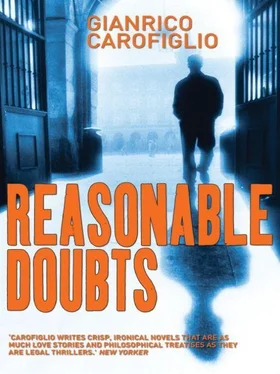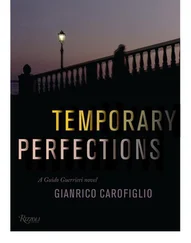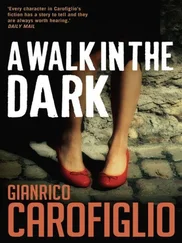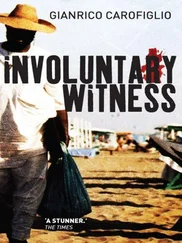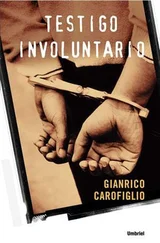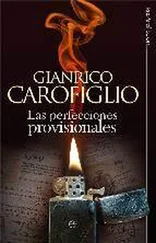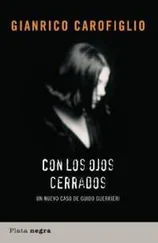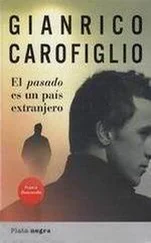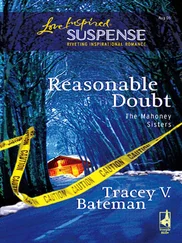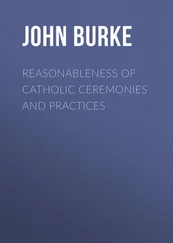Gianrico Carofiglio - Reasonable Doubts
Здесь есть возможность читать онлайн «Gianrico Carofiglio - Reasonable Doubts» весь текст электронной книги совершенно бесплатно (целиком полную версию без сокращений). В некоторых случаях можно слушать аудио, скачать через торрент в формате fb2 и присутствует краткое содержание. Жанр: Криминальный детектив, на английском языке. Описание произведения, (предисловие) а так же отзывы посетителей доступны на портале библиотеки ЛибКат.
- Название:Reasonable Doubts
- Автор:
- Жанр:
- Год:неизвестен
- ISBN:нет данных
- Рейтинг книги:5 / 5. Голосов: 1
-
Избранное:Добавить в избранное
- Отзывы:
-
Ваша оценка:
- 100
- 1
- 2
- 3
- 4
- 5
Reasonable Doubts: краткое содержание, описание и аннотация
Предлагаем к чтению аннотацию, описание, краткое содержание или предисловие (зависит от того, что написал сам автор книги «Reasonable Doubts»). Если вы не нашли необходимую информацию о книге — напишите в комментариях, мы постараемся отыскать её.
Reasonable Doubts — читать онлайн бесплатно полную книгу (весь текст) целиком
Ниже представлен текст книги, разбитый по страницам. Система сохранения места последней прочитанной страницы, позволяет с удобством читать онлайн бесплатно книгу «Reasonable Doubts», без необходимости каждый раз заново искать на чём Вы остановились. Поставьте закладку, и сможете в любой момент перейти на страницу, на которой закончили чтение.
Интервал:
Закладка:
Before she got out of the car, Natsu asked me for my mobile number. “I’ll call you in ten minutes,” she said, and was gone.
I went and parked a couple of streets further on. I switched off the radio and sat there, in silence, enjoying the forbidden, intoxicating sense of anticipation. Just over fifteen minutes later-I had looked at my watch at least ten times – my mobile phone rang. She told me I could come now if I wanted to. Yes, I did want to, I said to myself after ringing off. I left the car where I had parked it, walked a few hundred yards, and in five minutes I was back at the apartment building. When I reached the landing, I found Natsu waiting for me. She let me in and quickly closed the door.
The apartment had the characteristic smell of places where there are children. I hadn’t been to many but the smell was unmistakable. A mixture of talcum powder, milk, a hint of fruit and a few other things. Natsu led me to the kitchen. It was a large, warm, cheerful room with wooden furniture hand-varnished in yellow and orange. I told her I really liked the furniture and she replied that she had varnished all of it herself.
In the kitchen, the smell of children was less obvious, covered by the nice smells of food. I remember thinking how good this apartment smelled, and then I wondered what the bedroom was like, and what it smelled like. I immediately felt ashamed and forced myself to think about something else.
Natsu put on a CD. Feels Like Home by Norah Jones. At low volume, so as not to wake the little girl.
She asked me what I wanted to drink and I said I wouldn’t mind a little rum if she had any. She took a bottle of Jamaican rum from a cupboard and poured some into two large, thick glasses.
We were sitting at an orange-varnished wooden table. As we talked, I touched the surface of the table with my fingertips. I liked the touch of it, rough and smooth at the same time, and the bright orange colour. Everything in that kitchen gave me a feeling of sweet-smelling, light-filled solidity.
“You do know I came to watch you in court, just before Fabio appointed you?”
For some reason, I thought for a moment of saying, no, I didn’t know. Then I thought better of it.
“Yes, I saw you.”
“Ah. I thought that our eyes met once, but I wasn’t sure.”
“How did you come to be there?”
“Fabio told me he wanted to appoint you, so I thought I’d go and see if you were really as good as they’d told him you were.”
“And how did you know I was going to be in court that day?”
“I didn’t. I’d been going to the courthouse for a few days, walking past the courtrooms and asking people if anyone had seen a lawyer called Guerrieri. Once you passed by just as I was asking someone, and he was going to call you. I had to stop him. Then finally, they told me you were in court that morning, and your trial was just starting. So I went in and sat in on the whole hearing. And I thought you were as good as they said.”
I didn’t think I could hide my childish smugness and so I decided to change the subject.
“Do you mind my asking where your accent comes from?”
Before answering, she opened the window, emptied her glass and took out a cigarette. Did I mind if she smoked? No, I didn’t mind. Which was both true and false.
Her father, as I’d thought, was Japanese, and her mother from Naples. Her name was actually Maria Natsu, but no one had ever called her that. The name Maria only appeared on her papers, she said, and she paused for a few moments, as if this was something important that she’d only just become aware of.
Then she refilled our glasses and told me her story.
How she’d spent her childhood and adolescence partly in Rome, partly in Kyoto. How her parents had died in a road accident, while travelling. How she’d started work as a photographic and catwalk model. How she’d met Paolicelli in Milan.
“Fabio was part-owner of a dress showroom. I was twenty-three when we met. All the girls were crazy about him. I felt so privileged when he chose me. We got married a year later.”
“What’s the difference in age between you and him?”
“Eleven years.”
“How on earth did you end up in Bari, after Milan?”
“For a few years, Fabio’s work was going really well. Then things changed, I never understood why. I won’t go into details, because it isn’t a very amusing story, but his firm went bankrupt and in a few months we were completely penniless. That’s when we decided to come to Bari, which is Fabio’s home town. He was born here and lived here until he was nineteen. This apartment belonged to his parents and was available. So at least we wouldn’t have to pay rent.”
“Was that when you started working as a chef?”
“Yes. I’d learned to cook when I was young. My father had two restaurants in Rome. When we got to Bari we had to make a new life for ourselves. Fabio became the representative for some designers he’d known in Milan, and I found work at Placebo, where they needed a Japanese chef two evenings a week. Then they started to offer me work organizing dinners and receptions. That’s my main job now. Apart from the restaurant, I’m busy at least eight or nine evenings a month.”
“There’s a lot of money in this city. To organize a reception like the one tonight must seem like a good way to show it off.”
I was about to add that a lot of that money was of dubious provenance, to say the least. But then I remembered that her husband’s money might not be all that legitimate either and I said nothing.
“What about you?”
“Me?”
“You live alone, right?”
“Yes.”
“Have you always been alone? No wives or girlfriends?”
I made a noise that was meant to be a kind of bitter laugh. As if to say: Nobody knows the trouble I’ve seen.
“My wife left me some time ago. Or to be more precise, she told me she was leaving me some time ago.”
“Why?”
“Many excellent reasons.” I hoped she wouldn’t ask me what these excellent reasons were. She didn’t.
“And what happened after that?”
Yes. What had happened? I tried to tell her, leaving out the parts I hadn’t really understood and the parts that were too painful. There were a lot of those. When I’d finished my story, it was her turn again, and that was how we got onto the subject of her ex-boyfriend Paolo and the game of wishes.
“Paolo was a painter. For some reason you remind me of him. Unfortunately, I wasn’t in love with him.” She paused, and for a few moments her eyes seemed to be searching for something that wasn’t in the room. “He found a… a really beautiful way to tell me he liked me.”
“What was it?”
“The game of coloured wishes. He said a girlfriend had shown it to him, a few years before. But I’m sure he made it up on the spot, just for me.”
She paused again for a few moments, probably remembering other things that she didn’t tell me. Instead she asked me if I wanted to play the game. I said I did, and she explained the rules.
“You make three wishes. You have to say two of them, the third one you can keep secret. For the wishes to come true, they must have a colour.”
I half-closed my eyes and moved my head slightly towards her. Like someone who hasn’t heard, or hasn’t quite understood. “A colour?”
“Yes, it’s one of the rules. The wishes can only come true if they’re in colour.”
For the wishes to come true, they must be in colour. Right. Now I knew why none of the wishes I’d made in my life had come true. There was this rule, and no one had told me.
“Tell me your wishes.”
I can’t usually answer questions about wishes. Either I can’t or don’t want to. Which comes to the same thing.
Читать дальшеИнтервал:
Закладка:
Похожие книги на «Reasonable Doubts»
Представляем Вашему вниманию похожие книги на «Reasonable Doubts» списком для выбора. Мы отобрали схожую по названию и смыслу литературу в надежде предоставить читателям больше вариантов отыскать новые, интересные, ещё непрочитанные произведения.
Обсуждение, отзывы о книге «Reasonable Doubts» и просто собственные мнения читателей. Оставьте ваши комментарии, напишите, что Вы думаете о произведении, его смысле или главных героях. Укажите что конкретно понравилось, а что нет, и почему Вы так считаете.
